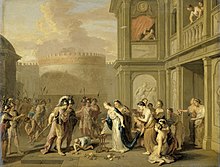Cleophis
| Cleophis | |
|---|---|
 | |
| Nama lain | Kripa |
| Dikenal atas | Perang di antara orang-orang Aśvaka dan Aleksander Agung |
| Suami/istri | Aleksander Agung |
| Anak | Aśvaka |
Cleophis (Sanskrit: Kripa)[1] merupakan seorang tokoh kunci di dalam perang di antara orang-orang Aśvaka dan Aleksander Agung. Cleophis adalah ibunda Asakanus, pemimpin perang Asakani pada saat invasi Aleksander pada tahun 326 SM. Setelah kematian putranya di dalam pertempuran, Cleophis mengambil alih komando dan menegosiasikan sebuah penyelesaian yang memungkinkannya mempertahankan statusnya. Catatan selanjutnya menyatakan bahwa Cleophis memiliki seorang putra oleh Aleksander, sebuah gagasan yang dibuang oleh para sejarahwan.[2]
Asakani (disebut Aśvaka di dalam Sanskerta, dari kata Ashva, yang berarti "kuda") adalah orang-orang bebas yang tinggal di bagian lembah-lembah Swat dan Buner di Pakistan modern. Orang-orang dataran tinggi ini adalah pemberontak, klan independen yang menentang penaklukan.[12] Keturunan mereka bertahan hidup hari ini dan sekarang dikenal sebagai etnis Afghan atau Pashtun.[3]
Referensi
[sunting | sunting sumber]- ^ According to scholars, Indian equivalent of classical name Cleophis is Kripa: See e.g: Chandragupta Maurya and His times, 1988, p 25, Dr R. K. Mukerjee; Ancient India, 2003, p 261, Dr V. D. Majan; History of Punjab, Vol I, 1997, p 229 Editors Dr L. M. Joshi, Dr Fauja Singh; Bhavan's Journal, 1960, p 90, Bharatiya Vidya Bhavan; Archaeology of Punjab, 1992, p 76, Bālā Madhu, Punjab (India); Ancient Kamboja, People and the Country, 1981, p 284, Dr J. L. Kamboj; Problems of Ancient India, 2000, p 149, K. D. Sethna.
- ^ Cf: The story of Cleophis' relations with the Macedonian king is heavily romanticized (Ref: The Greek World in the Fourth Century: From the Fall of the Athenian Empire to the Successors of..., 1997, p 211, Lawrence A. Tritle).
- ^ The Achaemenids in India, 1950, p 48, Dr Sudhakar Chattopadhyaya; The Indian Historical Quarterly, 1949, p 104, India.
Buku dan Majalah
[sunting | sunting sumber]- Historie du bouddhisme Indien, Dr E. Lammotte
- Alexander the Great, 2003 - Cambridge University Press, W. W. Tarn
- Political History of Ancient India, 1996, Dr H. C. Raychaudhury
- The Invasion Of India By Alexander The Great As Described By Arrian, Q. Curtius, Diodorus, Plutarch And Justin, J. W. McCrindle
- Envy of the Gods: Alexander the Great's Ill-fated Journey Across Asia, John Prevas
- Carnage and Culture: Landmark Battles in the Rise to Western Power, Victor Hanson
- Alexander: A History of the Origin and Growth of the Art of War from the Earliest Times to the Battle of Ipsus, 301 Bc, With a Detailed Account of the Campaigns, 1996- Da Capo Press, Theodore Ayrault Dodge
- Alexander the Great in Fact and Fiction, 2002 - Oxford University Press, USA, A. B. Bosworth and E. J. Baynham
- The Wars of Alexander the Great, 2002- Osprey Publishing, Waldemar Heckel
- Classical Accounts of India, J. W. McCrindle
- History and Culture of Indian People, The Age of Imperial Unity, Dr R. C. Majumdar, Dr A. D. Pusalkar
- Ancient India, 2003, Dr V. D. Mahajan
- Problems of Ancient India, 2000, K. D. Sethna
- The Pathan., 1967, Olaf Caroe
- Historical Essays, Second Series, 3rd edition, Edward A. Freeman, M. A., HON. D. C. L. & LL.D., Regius Professor of Modern History in the University of Oxford, London Macmillan and Co. And New York,1892
- Alexander the Great, 2003, Dr W. W. Tarn
- Studies in Indian History and Civilization, Dr Buddha Parkash
- Ancient Kamboja, People and the Country, 1981, Dr J. L. Kamboj
- Hindu Polity, A constitutional History of India in Hindu Times, 1978, p 140, 121, Dr K. P. Jayswal
